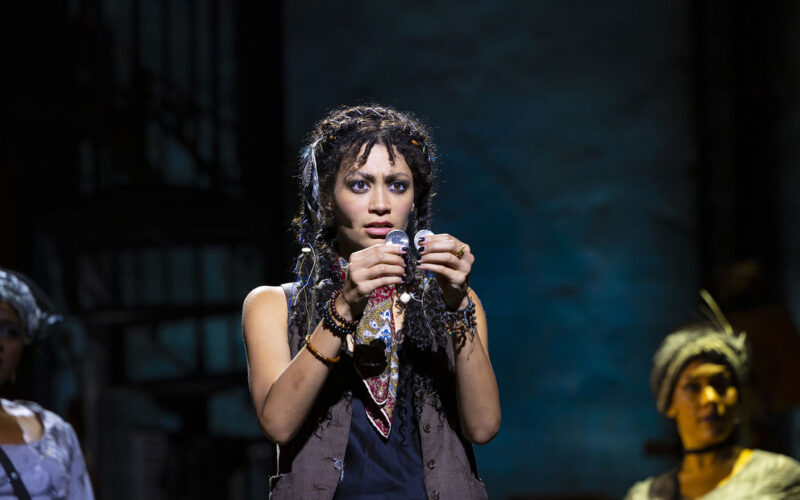MONICA HOOPER
mhooper@nwaonline.com
Drawing upon the Greek tragedy of Orpheus and Eurydice, a folk singer decided to create a play.
Anaïs Mitchell had already released two of her own albums and was working on another for Ani Difranco’s Righteous Babe Records when she decided to add a DYI theater project to her to-do list. Along with a theater group in Vermont, she began writing music and penning the story of the original star-crossed lovers, but this time set in a Great Depression-like version of New Orleans, Hades in the slums and Persephone singing in barrooms.
In 2007, the musical hit the small stage, and Michell put out her third album. Later she recorded an album, “Hadestown,” that included Difranco along with Justin Vernon of Bon Iver and Ben Knox Miller of The Low Anthem. All the while, she was touring and making music and expanding “Hadestown” with the help of director Rachel Chavkin, who later won one of the eight Tony awards bestoyed upon the unique musical.
Not long after Mitchell opened the show at New York Theatre Workshop in 2016, the show went to Canada, then London, then Broadway in 2019. Just as Persephone leaves the underworld, “Hadestown” comes to the Walton Arts Center in Fayetteville May 23-28.
We were honored to have Anaïs Mitchell reflect on the musical that she wrote so long ago during an interview with The Free Weekly.
Q. In what ways do you think audiences identify with the characters of Orpheus, Eurydice, Hades and Persephone — especially within the context of New Orleans during the Great Depression?
A. One of the beautiful things about having two intertwining love stories — one a story of young love, and one a story of an ancient and troubled marriage, is that I think audience members of different ages find someone to identify with.
As far as setting goes, Hadestown in meant to exist in mythic space, not tethered to any particular time or place, but it does take a lot of inspiration from the Great Depression era and the city of New Orleans. Something in the poetry of that time and place resonates with our show. The music. The extremes of poverty versus wealth, nature versus industry. The Dust Bowl was a sort of a natural disaster with a man-made cause — industrial farming practices that caused environmental chaos — kind of a vintage microcosm of what we see today with climate change.
Q. Which character did you identify most with when you started writing the music and why?
A. I think I identified with both Orpheus and Eurydice when I first started writing it. Orpheus, because he’s this songwriter trying to change the world through art — I’ve been there! And Eurydice, because she gets caught between her romantic ideals on the one hand, and the realities of life on the other. That’s a crossroads a lot of young people face.
Q. Which character do you relate to the most now and why?
I’d say the character I identify with most now is Hermes, the storyteller, the narrator. After spending so much time working on this piece — I lived with it about a dozen years before it landed on Broadway! — and doing a lot of rewriting, I identify with the world-weary storyteller who tries his damnedest to maintain the spark of hope for the story, for the world.
Q. In what ways did writing this musical change your process as a musician and songwriter?
My work with Rachel Chavkin, our director, coincided with the birth of my first daughter, and one of the results of that was that I had to become much more methodical, more regimented in my working hours. When you have a small child, time and energy is limited and you have to make the most of it. So I think that sense of routine, and also the sense that I had to show up for other people and keep deadlines, etc., was the most significant change.
Q Was “Hadestown” your first foray into theater and do you think you’ll do another theater project like this one?
A. It was my first, and though a lot of my regular songwriting could be considered sort of “story-telly”— I’m into lots of lyrics, ballads, the raconteur tradition — it is a whole other level to tell a dramatic story through song. I would love to do it again when the right project comes along.
—-
FAQ
‘Hadestown’
WHAT — A musical retelling of the myth of Orpheus and Eurydice written by folk singer-songwriter Anaïs Mitchell set during a Great Depression-like era in a city like New Orleans with a vibrant ensemble of actors, dancers and singers who bring to life the fates, Hades and Persephone, Hermes and more.
WHEN — 7 p.m. May 23 & May 24; 1:30 & 7 p.m. May 25; 8 p.m. May 26; 2 & 8 p.m. May 27; and 2 p.m. May 28
WHERE — Walton Arts Center in Fayetteville
COST — Tickets start at $75
INFO — waltonartscenter.org
BONUS — A pre-show cocktail class is available at 5:30 p.m. on May 25 and 6:30 p.m. May 26-27. Cocktail class tickets are $49 (purchased separately from the show ticket) and come with themed drinks and snacks. All are welcome whether attending the show or not.



